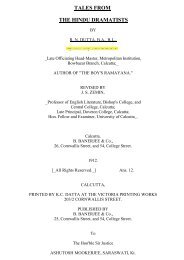TEUTONIC MAGIC - Awaken Video
TEUTONIC MAGIC - Awaken Video
TEUTONIC MAGIC - Awaken Video
You also want an ePaper? Increase the reach of your titles
YUMPU automatically turns print PDFs into web optimized ePapers that Google loves.
which was a practical necessity. The month of slaughtering was called Blotmonath (month of blessing) in<br />
heathen England, and it is likely that each animal was hallowed before it was slain. For this reason, unless<br />
one owns a farm at which animals are slaughtered regularly, it is not needful or even desired to revive the<br />
custom of animal sacrifice (it is also illegal, and leads to bad press). Pouring an offering of mead or ale<br />
over the harrow or onto the earth is all that is needed. Alternatively, one can make animals out of bread<br />
(charging them strongly with life-energy) and ritually slaughter and eat them, sprinkling mead or ale from<br />
the blessing bowl. The gift of loaves shaped like animals was used in Germany for several centuries after<br />
the Christianization of that land, and even today in Sweden the Yule boar survives as a pig- shaped cake.<br />
It is further customary to drink several minnehorns (horns of memory) at these feasts, according to<br />
the gods being honored. The best-documented toasts are those of Yule, where the first horn was drunk to<br />
Odhinn for victory, the second to Njord for fair winds and good sailing, and the third to Freyr for peace<br />
and prosperity. It is also written that some drank to Odhinn for victory in battle, but those who trusted<br />
more to their own strength called upon Thorr. If you feel particularly drawn to one of the gods or<br />
goddesses more than the others, you should of course drink that toast. Likewise, it is fitting to drink the<br />
minne of heroes, dead ancestors, and absent friends.<br />
Blessings can be offered at any tie of great need. You should, however, remember that the giving<br />
of a gift creates an obligation and that if you do this too often it begins to become annoying-to the gods as<br />
well as to humans.<br />
The practice of Teutonic religion is not necessary to the practice of Teutonic magic, but it is helpful<br />
both in that it strengthens your relationship with the gods-all of whom can aid in different aspects of<br />
magic-and in that it brings you to a greater awareness of the godly forces expressed in the runes, as well<br />
as of the Teutonic mindset as it grows to encompass the twentieth century. Performance of the blessings<br />
is also good for strengthening your sensitivity to the seasonal flows of power, just as the rite "Hail to<br />
Sunna" raises your ability to feel and use the greatest points of power in the course of the day.<br />
Guidelines and examples of the seasonal blessings may be found in Edred Thorsson's Book of Troth.<br />
In magical work with the gods, it is best to spend some time reading about them and performing<br />
meditations before you start performing rituals that involve them. Kevin Crossley-Holland's The Norse<br />
Myths is a good beginning source; the Eddas are, of course, invaluable. Meditations on the gods<br />
themselves can be performed from the descriptions here as searches. For guided meditations, one<br />
possibility is to use the meditation for the appropriate rune and instead of following it all the way through,<br />
stopping the reading at the point where you meet the god or goddess and allowing that being to speak<br />
directly to you, bringing yourself back to your own body and the earth after a space of time (no more than<br />
two to five minutes for a beginner). For this you will do best to tape yourself reading it. Stephen<br />
McNallen's tape "Pathways to the Gods" (available through World-Tree Publications, P.O. Box 961,<br />
Payton, AZ 85547) is an excellent source of truly beautiful guided meditations.<br />
133
















